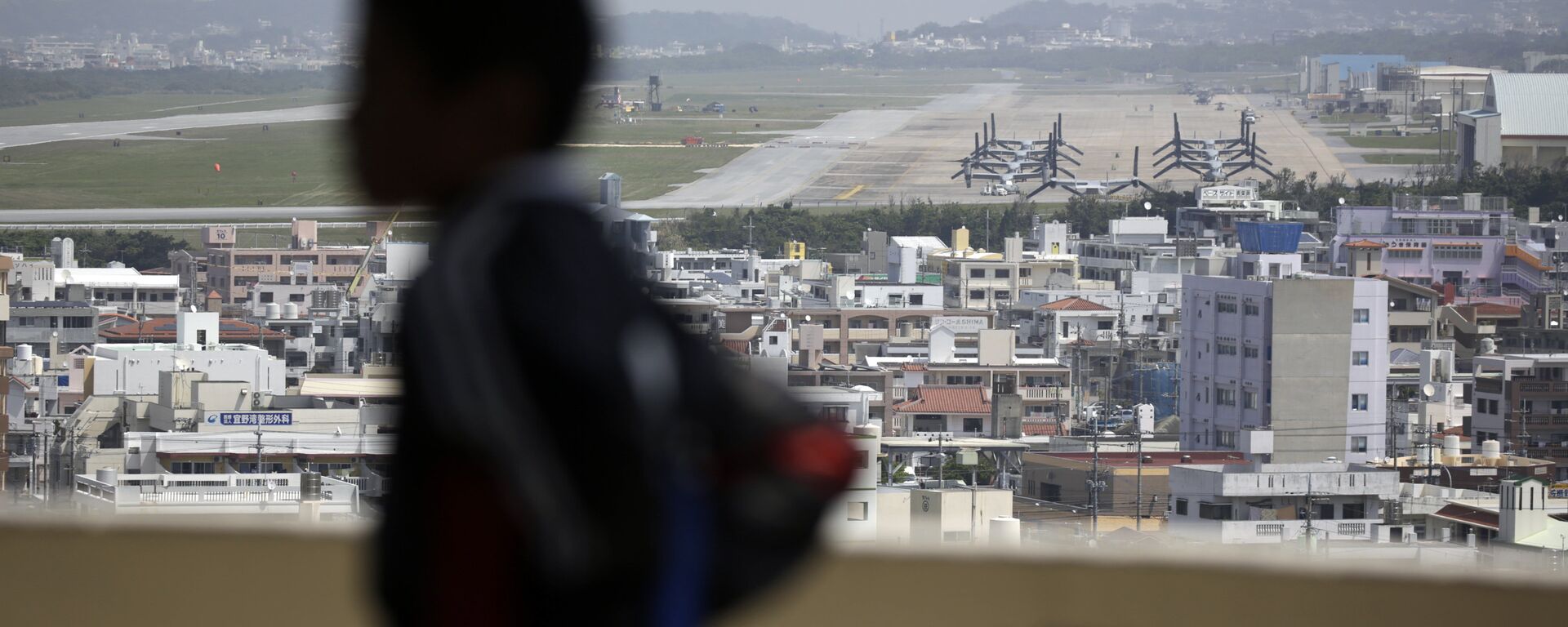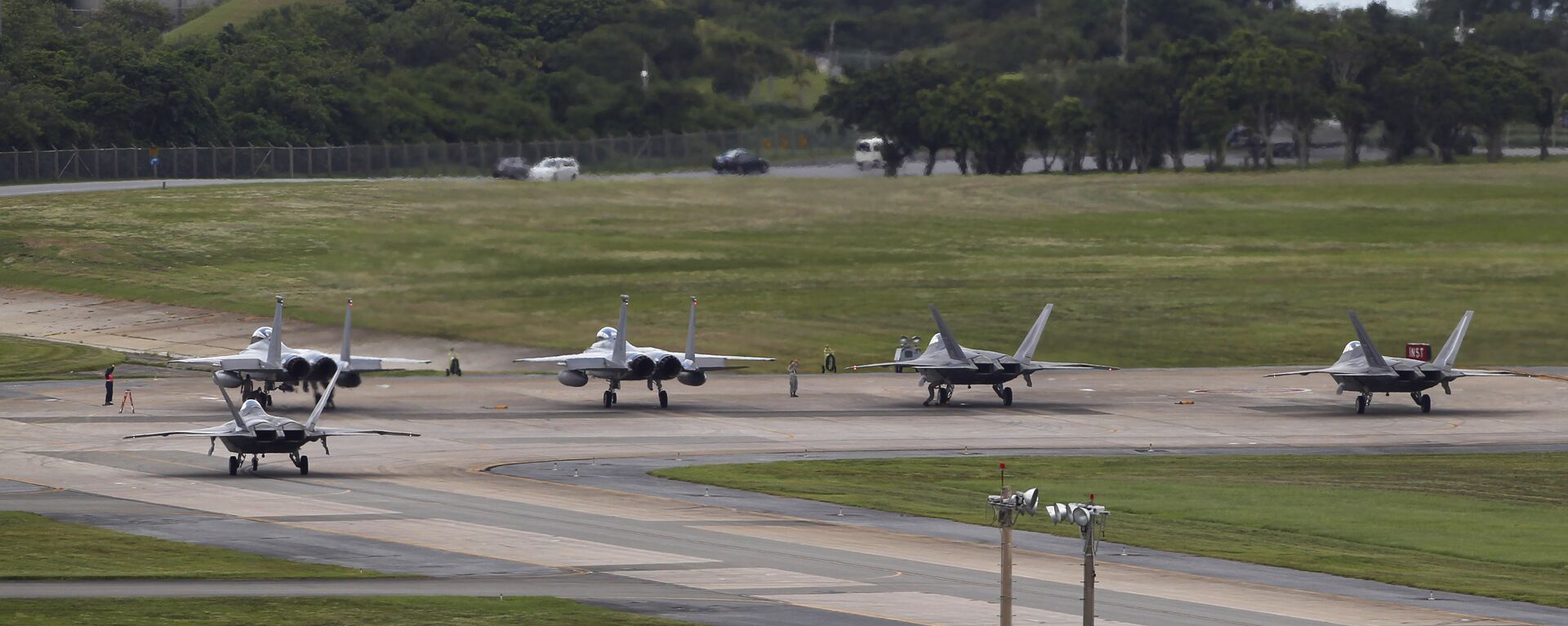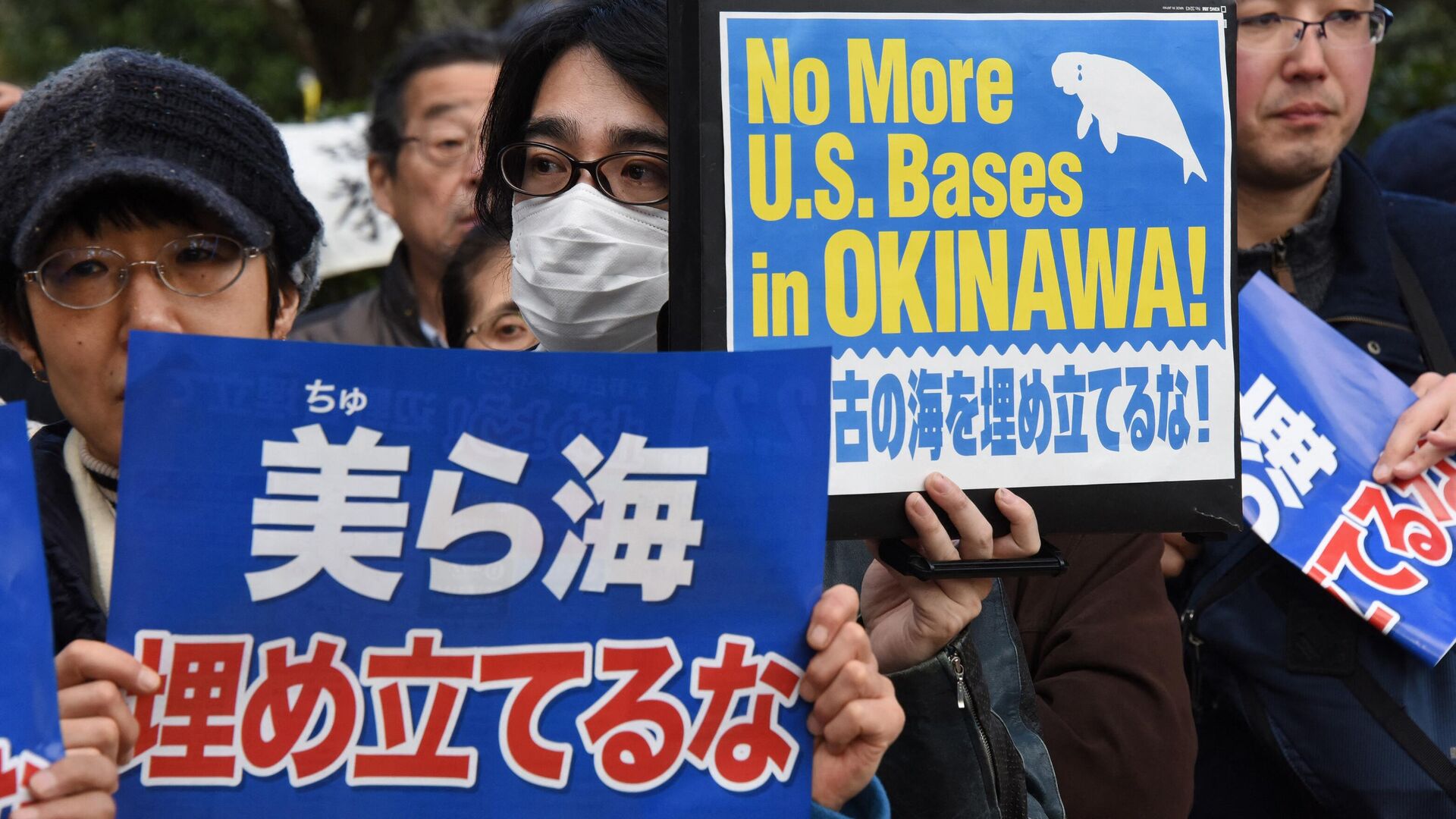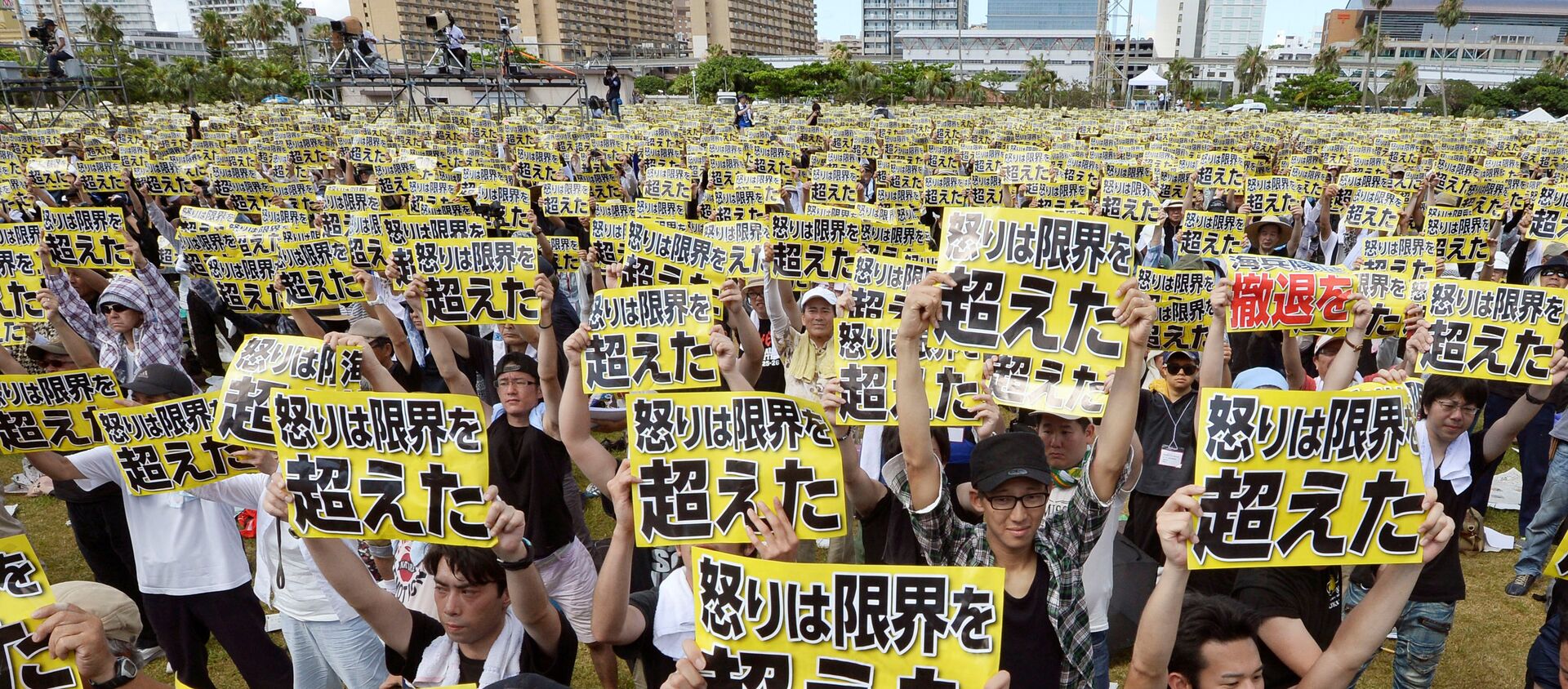https://sputnikglobe.com/20221227/rapes-robberies-and-falling-plane-parts-things-japanese-civilians-living-near-us-bases-worry-about-1105824158.html
Rapes, Robberies and Falling Plane Parts: Things Japanese Civilians Living Near US Bases Worry About
Rapes, Robberies and Falling Plane Parts: Things Japanese Civilians Living Near US Bases Worry About
Sputnik International
Tokyo has urged the US to “strengthen discipline” after a soldier stole a car from a dealership, crashed it into another vehicle and fled the scene. The incident isn't the first case of mischief perpetrated by a US serviceman.
2022-12-27T15:36+0000
2022-12-27T15:36+0000
2023-04-06T12:15+0000
world
us
us forces japan
okinawa
rape
murder
accident
incident
grand theft auto
japan
https://cdn1.img.sputnikglobe.com/img/07e6/0c/1b/1105824820_0:146:3125:1904_1920x0_80_0_0_64e6af26c7b26ebf5bbadb57042ac662.jpg
Tokyo offered a rare rebuke of its US allies on Tuesday, with Foreign Minister Yoshimasa Hayashi expressing “extreme regret” over an incident that took place earlier this month involving a Marine who took a stolen Honda for a joyride and collided with another vehicle near the Iwakuni Air Base.“In the city of Iwakuni on December 3, a US Marine stole a car and caused an accident. This is extremely regrettable. The Japanese government turned to the American side with a request to strengthen discipline, and show a serious attitude toward the injured party,” Hayashi said, speaking to journalists. The official emphasized that incidents of this kind are a cause for concern among residents.Viral photos and security cam footage published by local media show the apparently inebriated Marine breaking into the dealership, smashing the glass of its front door, entering the building and taking the keys of a white Honda Civic Type R, starting it up and driving off. One photo shows the aftermath of the hot-rodding, with the vehicle, which has a starting price of about 5.5 million yen (about $40,000 US), seen sitting on a road, surrounded by police, with its front bumper severely mangled and one of its headlamps damaged. Damage to the other vehicle was not shown, and it remains unclear whether anyone was injured.Japanese police identified the individual, but were not able to immediately arrest him due to the terms of the Japan-US Status of Forces Agreement, which gives the US military jurisdiction over what happens to a US service member accused of committing a crime on Japanese territory. The Marine has since been questioned.The United States contingent in Japan is one of the Pentagon’s largest foreign military deployments, with about 56,000 US troops deployed in the country at any one time. The US occupied Japan at the end of World War II in 1945, and has stayed in the country ever since, ostensibly to "protect" Tokyo against the Soviet Union, China, and North Korea. The security relationship has persisted in the decades since 1991, despite the end of the Cold War and warming ties between the West and China.Deja VuThe December 3 incident wasn’t even the first of its kind in recent years at Iwakuni, much less Japan as a whole. In June 2019, a Marine gunnery sergeant was put under investigation for allegedly stealing a car from a local woman employed at the Iwakuni base while under the influence of alcohol and crashing it into two other vehicles at a parking lot in a residential area. Police arrived at the scene to question the soldier, finding his blood alcohol level to be four times above the legal limit.Earlier this year, US media reported on another incident, this one involving a US Navy officer, who was sentenced to three years in jail for running down two pedestrians in May 2021 after falling asleep at the wheel of his car. The officer’s lawyers said the officer lost consciousness due to suffering from altitude sickness, and sought leniency, but the judge didn’t buy it. Last week, Congress assured that the jailed officer would continue to receive his military pay even while serving his prison sentence, granting him a special carve out attached to the $1.7 trillion omnibus budget bill passed on December 23.In November 2017, residents of Okinawa, home to some 32 bases operated by the US Army, Navy, Air Force, and Marine Corps, sprayed dozens of vehicles owned by US military personnel with paint and vandalized an apartment block containing US troops after a Marine ran a red light and crashed his two-ton military truck into a civilian vehicle driven by a 61-year-old local man, killing him. A breathalyzer test found the Marine’s blood alcohol level to be three times above the limit. The Pentagon instituted a ban on off-base drinking and a curfew to signal that it was doing something about the problem, but inexplicably lifted it just weeks later. Amid strong public pressure, the Marine was sentenced to four years in a Japanese jail.A year earlier, in 2016, a Navy sailor serving in Okinawa was arrested in another drunk driving incident after driving into the wrong lane of traffic and colliding with two civilian vehicles, injuring three people. Prosecutors sought three years in prison out of a maximum of 15, but the sailor was spared jail time after pleading guilty and being granted leniency.The Grand Theft Auto-style antics aren’t limited to vehicles. In 2020, Okinawa police charged a US Army soldier and his civilian friend over the theft of about $65,000 from a currency exchange broker at knifepoint. The pair were sentenced to between 3.5-4.5 years in prison after their heartfelt apologies failed to sway the judge.Rape and MurderDrunken US troops looking for adventure aren’t the worst of Japanese civilians’ worries. In 2016, a 20-year-old Okinawa woman was raped and strangled to death by a 32-year-old former US Marine working at the Kadena Air Base in Okinawa. The incident, which at the time was the latest in a string of similar crimes, sparked mass protests, with the former soldier sentenced to life in prison with hard labor by the Naha District Court in December 2017.The case was very high profile, but far from the only, or last, incident of its kind. In late 2021, the United States Naval Criminal Investigative Service chronicled eight other serious sexual offenses against civilians by servicemen in Okinawa between 2017 and 2019 alone, involving everything from public masturbation to rape, with none of these cases going public.Okinawa Women Act Against Military Violence, a local advocacy group, has recorded hundreds of gruesome crimes of a sexual nature against civilians as young as nine months old from the 1940s onward. The most egregious among them, such as the 1995 rape of a 12-year-old girl by three US service members, receive public attention, but inevitably die down, often as US and Japanese authorities seek to sweep the scandals under the rug.Falling Aircraft PartsAlong with the aforementioned problems, some Japanese residents living near American bases also face the danger of airplane and helicopter parts raining down on their heads.The list of incidents seems endless, random, and ludicrous. In one week in December of 2017 alone, two incidents involving parts falling out of a US aircraft were reported in Okinawa, with the first involving a cylindrical object dropping onto the roof of a local nursery, and the second involving a one-square-meter metal-framed window from a CH-53E chopper crashing near a field where about 50 students were playing soccer.In February 2018, an antenna component fell off an F-15 fighter jet flying over Okinawa. In October 2019, a part fell off an MC-130J cargo hauler onto a US base, again in Okinawa. Late last year, Japanese media reported that a stainless steel water bottle had dropped out of a US Marine Osprey onto a local residence, once again on the long-suffering island.In late 2021, the US deputy commander of Misawa Air Base in Aomori, northern Japan offered a rare public apology to his hosts over an incident which saw a US Air Force F-16 fighter drop its fuel tanks in a residential area while performing an emergency landing. The commander apologized after one of the fuel tanks was discovered about 20-30 meters from an apartment building, despite initial claims that the tanks were ejected safely far away from any residential areas. Fortunately, no one was hurt in that incident.Toxic SludgeAs if dodging drunk drivers, rapists, robbers, and falling wreckage isn't enough, Japanese civilians living near US bases also face a hidden, much more widespread threat: improper disposal of toxic pollutants.In 2016, the Okinawa Prefectural Enterprise Bureau reported that high levels of toxic Perfluorooctanesulfonate acid (PFOS) and perfluorooctanoic acid (PFOA) chemicals –ingredients in fire extinguishing agents, aircraft lubricants, and water repellants, had been found in groundwater and waterways supplying drinking water to seven local municipalities, with the US military accused of knowingly failing to report the runoff to authorities and dumping it into local sewers.Subsequent investigations discovered that such toxic chemicals, which Japan banned from use in 2010, are present around US bases across the country, threatening to cause a health emergency, given their highly carcinogenic properties. A survey carried out in September 2022 found that PFOA levels at the US Navy’s Yokosuka Base in Kanagawa Prefecture, central Japan exceeded the legal limit by 258 times. Meanwhile, in Okinawa Prefecture, PFOS levels among residents were found to be between 5.8 and 12.2 nanograms per milliliter of blood, up to three times above the national level.Japan’s residents have paid a high price for the "protection" Tokyo ostensibly enjoys from Washington. With Japan planning to ramp up military spending to levels unseen since World War II, and requiring billions of dollars in US weapons to build up its army, navy, and air force, it seems the presence of tens of thousands of US military personnel will be guaranteed for decades to come.
https://sputnikglobe.com/20171119/japan-road-accident-car-crash-1059234420.html
https://sputnikglobe.com/20160619/okinawa-us-military-protest-1041589295.html
https://sputnikglobe.com/20191022/us-air-force-recovers-missing-piece-of-special-operations-plane-at-okinawa-base-1077121885.html
https://sputnikglobe.com/20170419/banned-pollutant-under-marines-base-1052761748.html
okinawa
japan
Sputnik International
feedback@sputniknews.com
+74956456601
MIA „Rossiya Segodnya“
2022
News
en_EN
Sputnik International
feedback@sputniknews.com
+74956456601
MIA „Rossiya Segodnya“
Sputnik International
feedback@sputniknews.com
+74956456601
MIA „Rossiya Segodnya“
japan, us, military, base, grand theft auto, sexual assault, rape, murder, sludge, toxic waste, us base, us forces japan
japan, us, military, base, grand theft auto, sexual assault, rape, murder, sludge, toxic waste, us base, us forces japan
Rapes, Robberies and Falling Plane Parts: Things Japanese Civilians Living Near US Bases Worry About
15:36 GMT 27.12.2022 (Updated: 12:15 GMT 06.04.2023) Tokyo has urged the US military to “strengthen discipline” among its forces after a soldier stole a car from a dealership in southern Japan, crashed it into another vehicle, and fled the scene. The incident is far from the first, or the worst, case of mischief perpetrated by a US serviceman in the Asian nation. Sputnik takes a look at some others.
Tokyo offered a rare rebuke of its US allies on Tuesday, with Foreign Minister Yoshimasa Hayashi expressing “extreme regret” over an
incident that took place earlier this month involving a Marine who took a stolen Honda for a joyride and collided with another vehicle near the Iwakuni Air Base.
“In the city of Iwakuni on December 3, a US Marine stole a car and caused an accident. This is extremely regrettable. The Japanese government turned to the American side with a request to strengthen discipline, and show a serious attitude toward the injured party,” Hayashi said, speaking to journalists. The official emphasized that incidents of this kind are a cause for concern among residents.
Viral photos and security cam footage published by local media show the apparently inebriated Marine breaking into the dealership, smashing the glass of its front door, entering the building and taking the keys of a white Honda Civic Type R, starting it up and driving off. One photo shows the aftermath of the hot-rodding, with the vehicle, which has a starting price of about 5.5 million yen (about $40,000 US), seen sitting on a road, surrounded by police, with its front bumper severely mangled and one of its headlamps damaged. Damage to the other vehicle was not shown, and it remains unclear whether anyone was injured.
Japanese police identified the individual, but were not able to immediately arrest him due to the terms of the Japan-US Status of Forces Agreement, which gives the US military jurisdiction over what happens to a US service member accused of committing a crime on Japanese territory. The Marine has since been questioned.
The United States contingent in Japan is one of the Pentagon’s largest foreign military deployments, with about 56,000 US troops deployed in the country at any one time. The US occupied Japan at the end of World War II in 1945, and has stayed in the country ever since, ostensibly to "protect" Tokyo against the Soviet Union, China, and North Korea. The security relationship has persisted in the decades since 1991, despite the end of the Cold War and warming ties between the West and China.
The December 3 incident wasn’t even the first of its kind in recent years at Iwakuni, much less Japan as a whole. In June 2019, a Marine gunnery sergeant was put under investigation for allegedly stealing a car from a local woman employed at the Iwakuni base while under the influence of alcohol and crashing it into two other vehicles at a parking lot in a residential area. Police arrived at the scene to question the soldier,
finding his blood alcohol level to be four times above the legal limit.
Earlier this year, US media reported on another incident, this one involving a US Navy officer, who was sentenced to three years in jail for running down two pedestrians in May 2021 after falling asleep at the wheel of his car. The officer’s lawyers said the officer lost consciousness due to suffering from altitude sickness, and sought leniency, but the judge didn’t buy it. Last week, Congress assured that the jailed officer would
continue to receive his military pay even while serving his prison sentence, granting him a special carve out attached to the $1.7 trillion omnibus budget bill passed on December 23.
In November 2017, residents of Okinawa, home to some
32 bases operated by the US Army, Navy, Air Force, and Marine Corps, sprayed dozens of vehicles owned by US military personnel with paint and vandalized an apartment block containing US troops after a Marine ran a red light and crashed his two-ton military truck into a civilian vehicle driven by a 61-year-old local man, killing him. A breathalyzer test found the Marine’s blood alcohol level to be three times above the limit. The Pentagon
instituted a ban on off-base drinking and a curfew to signal that it was doing something about the problem, but
inexplicably lifted it just weeks later. Amid strong public pressure, the Marine was sentenced to four years in a Japanese jail.

19 November 2017, 11:44 GMT
A year earlier, in 2016, a Navy sailor serving in Okinawa was arrested in another drunk driving incident after driving into the wrong lane of traffic and colliding with two civilian vehicles, injuring three people. Prosecutors sought three years in prison out of a maximum of 15, but the sailor was spared jail time after pleading guilty and being
granted leniency.The Grand Theft Auto-style antics aren’t limited to vehicles. In 2020, Okinawa police
charged a US Army soldier and his civilian friend over the theft of about $65,000 from a currency exchange broker at knifepoint. The pair were sentenced to between 3.5-4.5 years in prison after their heartfelt
apologies failed to sway the judge.
Drunken US troops looking for adventure aren’t the worst of Japanese civilians’ worries. In 2016, a 20-year-old Okinawa woman was raped and strangled to death by a 32-year-old former US Marine working at the Kadena Air Base in Okinawa. The incident, which at the time was the latest in a string of similar crimes,
sparked mass protests, with the former soldier sentenced to life in prison with hard labor by the Naha District Court in December 2017.
The case was very high profile, but far from the only, or last, incident of its kind. In late 2021, the United States Naval Criminal Investigative Service
chronicled eight other serious sexual offenses against civilians by servicemen in Okinawa between 2017 and 2019 alone, involving everything from public masturbation to rape, with none of these cases going public.
Okinawa Women Act Against Military Violence, a local advocacy group, has recorded
hundreds of gruesome crimes of a sexual nature against civilians as young as nine months old from the 1940s onward. The most egregious among them, such as the 1995 rape of a 12-year-old girl by three US service members, receive public attention, but inevitably die down, often as US and Japanese authorities seek to sweep the scandals under the rug.
Along with the aforementioned problems, some Japanese residents living near American bases also face the danger of airplane and helicopter parts raining down on their heads.
The list of incidents seems endless, random, and ludicrous. In one week in December of 2017 alone, two incidents involving parts falling out of a US aircraft were reported in Okinawa, with the first involving a cylindrical object dropping onto the roof of a local nursery, and the second involving a one-square-meter metal-framed window from a CH-53E chopper crashing near a field where about 50 students were playing soccer.
In February 2018, an antenna component
fell off an F-15 fighter jet flying over Okinawa. In October 2019, a part fell off an MC-130J cargo hauler
onto a US base, again in Okinawa. Late last year, Japanese media reported that a stainless steel water bottle had
dropped out of a US Marine Osprey onto a local residence, once again on the long-suffering island.

22 October 2019, 20:35 GMT
In late 2021, the US deputy commander of Misawa Air Base in Aomori, northern Japan offered a
rare public apology to his hosts over an incident which saw a US Air Force F-16 fighter drop its fuel tanks in a residential area while performing an emergency landing. The commander apologized after one of the fuel tanks was discovered about 20-30 meters from an apartment building, despite initial claims that the tanks were ejected safely far away from any residential areas. Fortunately, no one was hurt in that incident.
As if dodging drunk drivers, rapists, robbers, and falling wreckage isn't enough, Japanese civilians living near US bases also face a hidden, much more widespread threat: improper disposal of toxic pollutants.
In 2016, the Okinawa Prefectural Enterprise Bureau reported that high levels of toxic Perfluorooctanesulfonate acid (PFOS) and perfluorooctanoic acid (PFOA) chemicals –ingredients in fire extinguishing agents, aircraft lubricants, and water repellants, had been
found in groundwater and waterways supplying drinking water to seven local municipalities, with the US military accused of knowingly failing to report the runoff to authorities and dumping it into local sewers.
Subsequent investigations discovered that such toxic chemicals, which Japan banned from use in 2010, are present around US bases
across the country, threatening to cause a health emergency, given their highly carcinogenic properties. A survey carried out in September 2022 found that PFOA levels at the US Navy’s Yokosuka Base in Kanagawa Prefecture, central Japan exceeded the legal limit by 258 times. Meanwhile, in Okinawa Prefecture, PFOS levels among residents were found to be between 5.8 and 12.2 nanograms per milliliter of blood, up to three times above the national level.
Japan’s residents have paid a high price for the "protection" Tokyo ostensibly enjoys from Washington. With Japan planning to ramp up military spending to levels unseen since World War II, and
requiring billions of dollars in US weapons to build up its army, navy, and air force, it seems the presence of tens of thousands of US military personnel will be guaranteed for decades to come.





